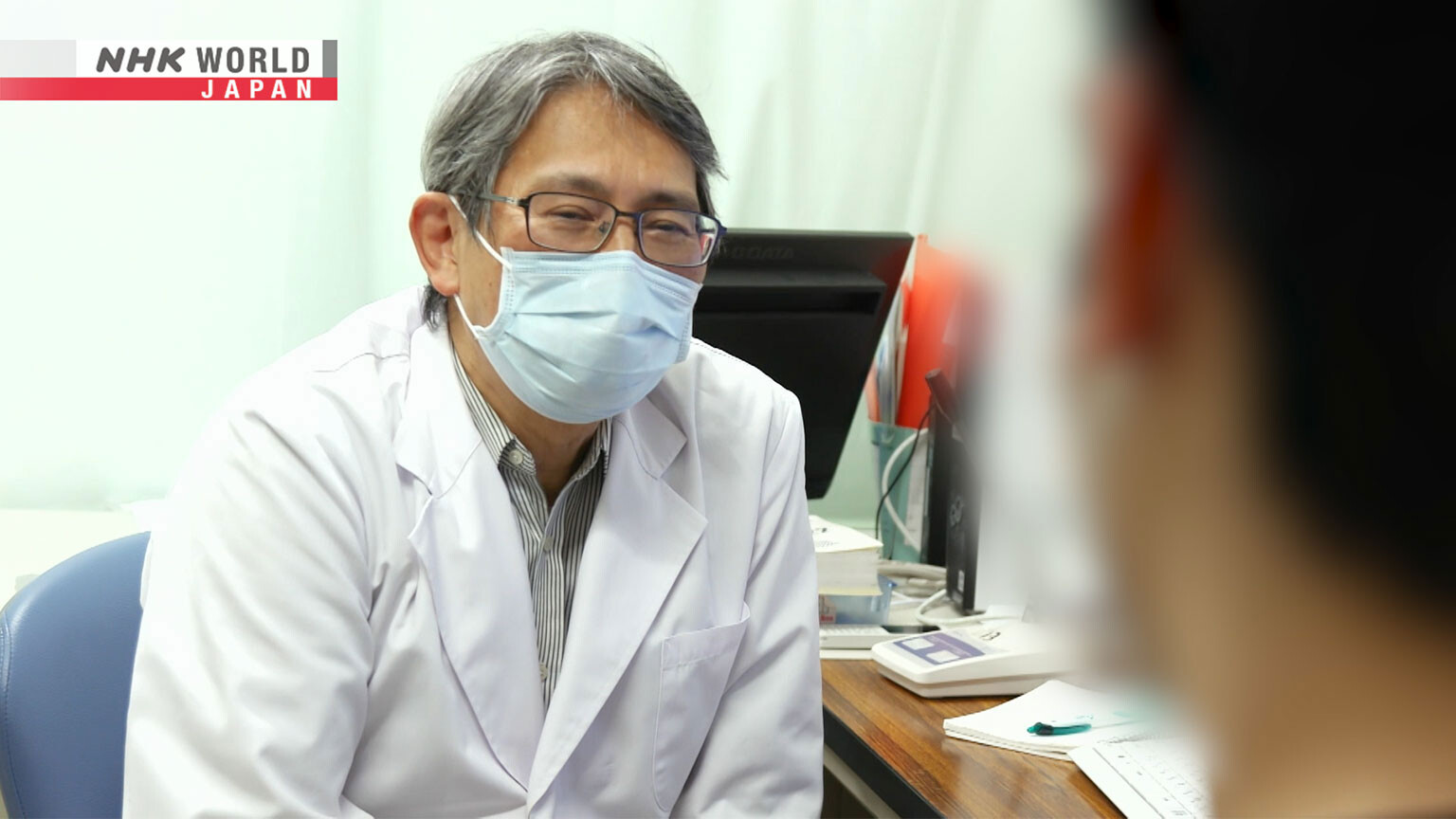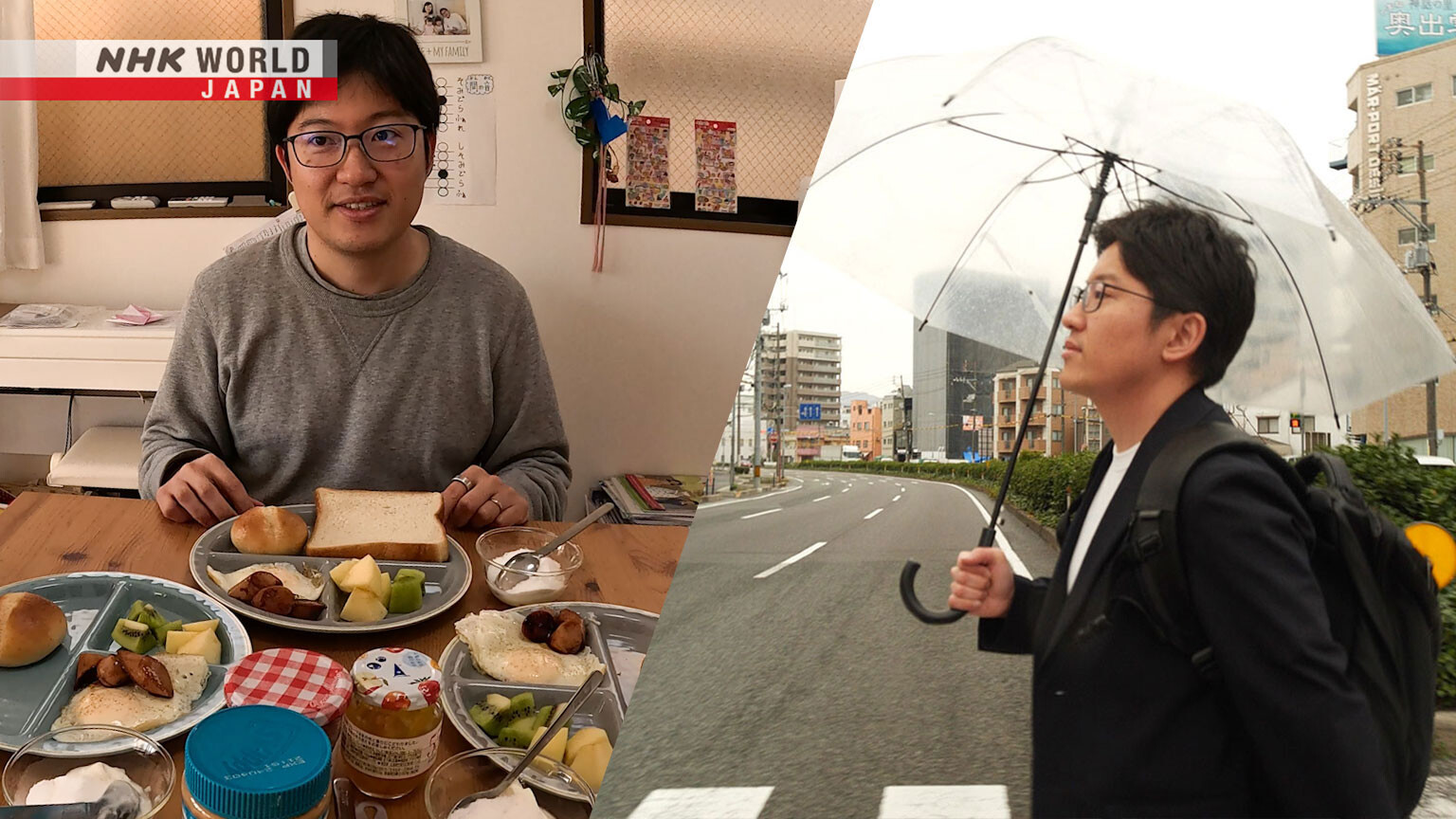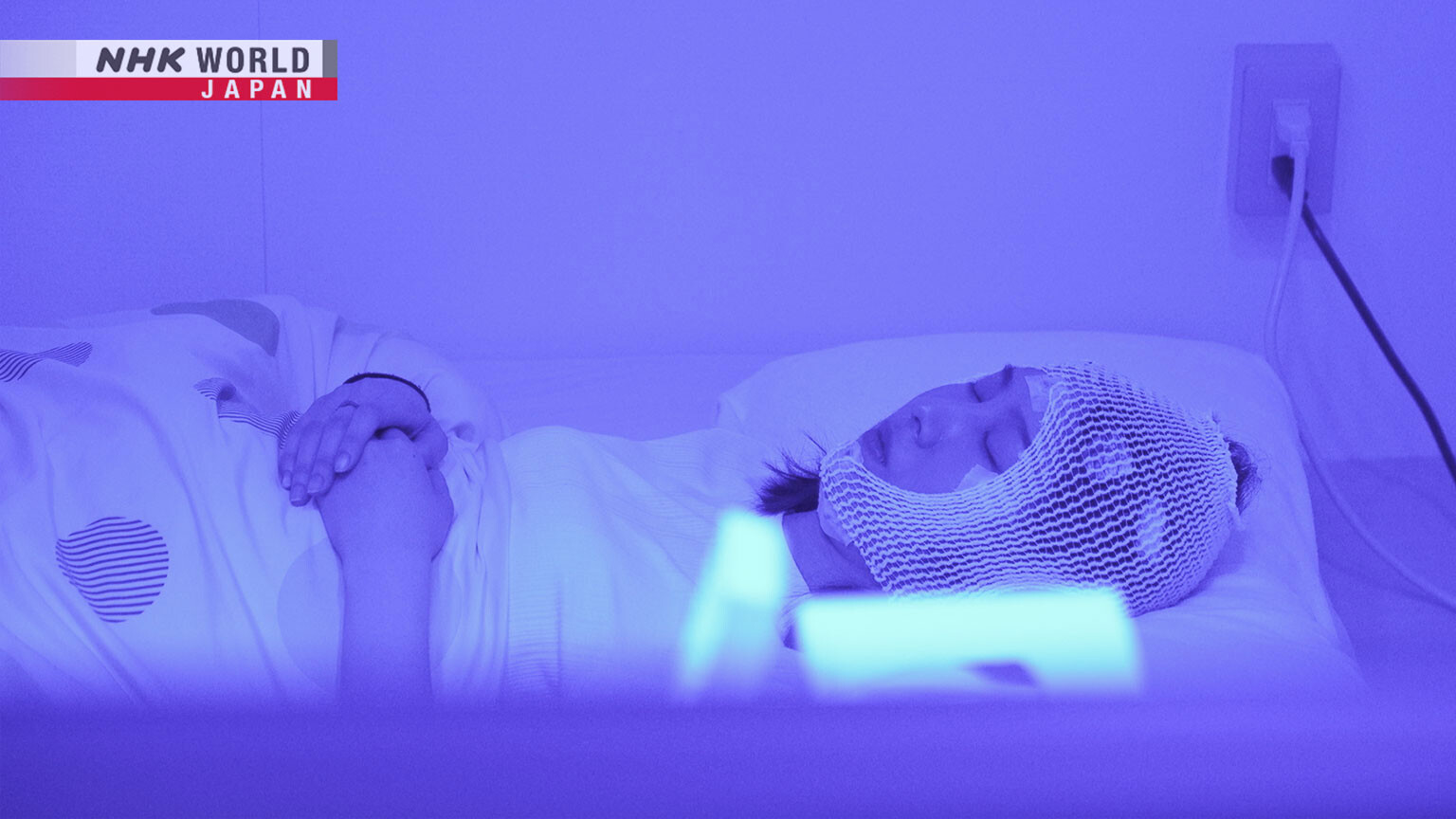Need Good Sleep? Reset Your Body Clock
New research results have revealed that resetting a disrupted body clock can improve sleep. We introduce a hospital that offers clock-resetting treatments and share dietary tips for better sleep.




Transcript
A good night's sleep is what everyone wants.
But it's not something that everyone manages to get.
A critical factor that helps us achieve great sleep is our internal body clock.
Early risers are often celebrated,
but Japanese researchers have revealed that in some cases it might not be the most beneficial as once thought.
Kindai University Hospital's Shigeyoshi Yasufumi provides outpatient care to people with sleep problems.
He offers treatment focusing on the body's internal clock.
How's it going? Are you able to get up? You seem to sleep until noon.
If I have plans the next day, I try to sleep early. But without plans, I can't sleep.
Researchers believe our bodies contain a clock that operates on a roughly 24-hour cycle.
We feel sleepy at night and wake up in the morning because this clock regulates our sleep.
But when the clock is disrupted by stress or other factors,
we develop sleep disorders, which make it difficult to sleep and wake up at the desired time.
I wake up feeling tired, so I doze off.
Your body clock is still out of sync.
It would be ideal if your clock could switch on when you get up.
But it's probably stuck in night mode.
It feels like I'm half asleep.
This 18-year-old visited Shigeyoshi three years ago due to sleep problems.
This is the sleep diary he kept at the time.
The blacked-out sections indicate when he was asleep.
The areas with diagonal lines show when he was in bed, but couldn't sleep.
He would wake up around 1 or 2 PM.
He couldn't sleep at night. He'd finally fall asleep in the morning and wake up late in the day.
His sleep schedule was irregular, and he would often sleep for long periods.
During his first year of high school, he had problems with friends from his extracurricular activities.
After that, it became increasingly difficult for him to get up in the morning.
On some days, he even slept 18 hours straight.
I tried many different ways to wake him up.
I'd pull off his blankets with his brother and wrap ice packs around his body.
I would even shout, but there was no response.
I cried every day.
They raised me with so much love for 17 years.
I felt so sorry.
He couldn't wake up in the morning and didn't go out, so his internal clock wouldn't reset.
Getting up and going to school grew harder. Eventually, his days and nights became reversed.
Shigeyoshi gave the worried mother some unexpected advice.
He told me not to wake my son. I was surprised and wondered if I'd heard him correctly.
Her son was experiencing what is known as social jet lag.
This refers to a misalignment between the body clock and social obligations, such as school or work.
In some people, their body clock remains in night mode,
telling them to stay asleep, even when it's morning and the sun has risen.
Sometimes, society pushes us to be active when our bodies want to rest.
Our internal clocks haven't evolved to meet such demands, but they're forced to follow along.
This often leads to disorders and other health problems.
Shigeyoshi prescribed a sleep inducer and suggested an unconventional approach.
He recommended transferring to a school that didn't require commuting early in the morning.
A simple change of environment can lead to recovery for some people, so I recommended it.
I was told that a high school that I could attend at my own pace might be better for me.
So I decided to enroll in a correspondence school to earn my high school diploma.
Shigeyoshi also gave him a few rules.
First, get up only after plenty of sleep.
Second, get some sunlight to reset the body clock.
And third, have breakfast.
I first focused on creating a routine of eating my 3 meals at the same time every day.
About four months after changing schools,
he gradually became able to wake up earlier.
Eight months after that, he was going to bed by around 11 p.m., waking up at 8 a.m.,
and willingly attending school every morning.
And in April 2024, he entered his top-choice university.
Is this the suit you wore at the entrance ceremony?
It felt different from my high school uniform. It made me proud and happy.
In a way, it felt like I was dreaming.
Seeing my son happy made all the difficulties we had faced disappear in an instant.
In the future, I want to help kids in situations similar to mine.
I plan on becoming a certified social worker.
The body clock is controlled by clock genes that are found in each cell.
The clock genes in a part of the brain called the suprachiasmatic nucleus act as the central clock,
giving instructions to the other clocks throughout the body.
The suprachiasmatic nucleus is in an area that catches light entering through the eyes.
Therefore, the central clock is strongly affected by light.
Clock genes are present in all organs, including the stomach, intestines, liver and muscles.
They are called peripheral clocks, and they each have their own cycles.
These peripheral clocks receive commands from the central clock.
They can also be directly affected by diet and exercise.
Japanese researchers have led global studies of clock genes with numerous discoveries.
One such researcher is Tahara Yu from Hiroshima University.
Tahara has been using special technology to visualize clock genes in live mice.
He is trying to apply his findings to humans.
Each person's body clock is different.
There are morning people and night people, known as chronotypes in medical terms.
Minor variations, or genetic snips, in the body clock result in individual differences.
They may determine our chronotype.
In other words, our genes control our body clock and affect our sleep.
A study in Britain analyzed the impact of cognitive and physical performance in healthy people
of morning and evening chronotypes to determine their characteristics.
The researchers measured subjects' sleepiness with a scale used worldwide.
They found that morning people rarely feel sleepy before noon and become sleepier toward evening.
On the other hand, evening people feel sleepiest in the morning and more awake later in the day.
The researchers also conducted an attention test and found
that morning types tend to be more attentive early in the day.
In contrast, night owls become increasingly alert toward evening.
Tahara says that knowing whether you're a morning or evening type
can help you plan your day to maximize your productivity.
Thank you for joining us.
Nice to meet you.
Tahara developed his own method to determine chronotype.
He used sleep data from over 13,000 Japanese people and classified them into three types: morning, intermediate and evening.
Based on this, he created a scale for each age group, from those in their 20s to those in their 60s and above.
So my sleep is terrible. But I'd love to know what my chronotype is.
Let's find out.
What time did you go to sleep and wake up on your recent days off?
The key is sleep time on days off.
On weekdays, work or school schedules often force people to sleep at times that don't match their natural sleep needs.
Okay great, so maybe I go to bed about one and I get up maybe it depends on the day, maybe about nine.
But I'm waking up through the night too.
Next, let's calculate your sleep midpoint.
The midpoint of sleep is the time halfway between bedtime and wake-up time.
You sleep from 1 AM to 9 AM.
That's 8 hours, so the midpoint is 5 AM.
Let's see where 5 AM falls in terms of your age.
I am 54...
Among people in their 20s, those with a midpoint earlier than 4 a.m. are morning people.
Those with a midpoint later than 5 are evening people.
In their 30s, morning types have a midpoint earlier than 3:30 a.m.
Evening types have a midpoint later than 4:30.
For people in their 40s and 50s, if the midpoint is earlier than 3a.m., you're an early bird.
Later than 4, and you're a night owl.
Erica is 54, and her midpoint is 5 a.m., which means she has an evening chronotype.
And for those in their 60s and above,
those with a midpoint earlier than 2:30 a.m. are morning types,
while those with a midpoint later than 3:30 are evening types.
- You're a night owl.
- I thought so.
I think I'm definitely a night owl.
And I know I'm definitely not a morning person.
So in terms of people who for example like me who's a night owl,
what suggestions do you have to kind of, I guess,
to then improve your own situation if you are for example, a different chronotype to early risers?
Don't go to work in the morning.
Okay great. I have an excuse; no more early starts!
Skipping the first school period has benefits, as shown in studies by Singapore and Western nations.
Delaying elementary school start times by 45 minutes improved happiness, grades and sleep.
Similarly, the stay-at-home measures implemented in Japan during the pandemic had notable effects.
They helped to improve people's sleep quality and get rid of social jet lag.
However, there are people who need to live in accordance with social schedules.
Let's look at how they can adjust their internal clocks.
So then how do we reset our body which is out of sync?
The best way is to expose yourself to morning sunlight and have breakfast.
Indoor lighting is weak. Sunlight is completely different, so start by exposing yourself to it.
Getting more sunlight when going to school or work is the first thing to do.
Tahara walks to his university every day to get sunlight.
At least 15 minutes of daily walking is recommended.
Even when it's raining, it's brighter outside than indoors, so it's better to take a walk.
Having a meal after fasting overnight helps to adjust your internal clock.
The internal clock is also realigned by having a meal after fasting.
From night until morning, the body goes through a period of not eating.
It's only after having breakfast and being exposed to light that the clock genes realize it's morning.
Having breakfast raises blood sugar levels, leading to insulin secretion, which resets the body clock.
Tahara's team did an experiment, dividing children into three groups based on academic performance.
They then compared the percentage of breakfast eaters.
Among elementary school students, 87 percent of those with lower grades ate breakfast,
compared with 92 percent of children with higher grades.
Similar trends were observed among middle school and high school students.
Tahara believes that breakfast improves both sleep and academic performance.
It's worth noting that the ideal breakfast can be found in Japan.
A traditional Japanese breakfast includes rice, miso soup and grilled fish.
They enhance insulin function and reset the body clock.
Meals realign the peripheral clocks in the stomach and intestines.
Eating a meal at the wrong time can disrupt the internal clock.
Many people in Japan, especially those in their 20s and 30s, don't have breakfast.
Recent surveys show that 20 to 30 percent of the people in this age group skip breakfast.
Lunch is the first meal they eat, so their clocks are reset not in the morning, but later in the day.
So Dr. Tahara, going forward.
What are your goals, I guess, for the next research you'd like to work on?
Society works in favor of morning people.
But 1 in 4 people is a night owl. It's really tough for them.
Being a night owl isn't necessarily bad, so I think our society needs to change.
Our bodies continue with energy metabolism even while we sleep.
Tsukuba University's Tokuyama Kumpei has been studying metabolism during sleep for over 20 years.
Our sleep and metabolism don't remain the same throughout the night.
We thoroughly researched this.
Our bodies continue to burn the carbohydrates and fats we've consumed, even during sleep.
However, the details of when and what exactly is burned during sleep have remained unclear.
To investigate this, Tokuyama's team did an experiment using a special room
called the high-performance human calorimeter.
This sealed chamber was supplied with oxygen, and participants were asked to sleep inside.
The researchers then measured the participants' oxygen intake and carbon dioxide release levels,
both of which were very minimal.
By comparing the ratio of oxygen intake to carbon dioxide release,
the researchers determined whether the body was burning carbohydrates or fats.
In the experiment, 29 participants entered the room two hours before their bedtime
and were instructed to sleep for eight hours.
The data revealed how our metabolism changes throughout our sleep.
This graph shows that their fat metabolism increased shortly after they fell asleep,
then began to decline around the midpoint of sleep.
In contrast, carbohydrate metabolism initially fell sharply after they went to sleep,
but began to rise toward the end of sleep.
It was previously thought that as time passed since dinner and the body's carbohydrate stores decreased,
the fuel for energy metabolism would shift from carbohydrate to fat.
However, the experiment found that carbohydrate burning resumed before waking.
The experiment was led by Park Insung.
I think the body readies itself for waking up by burning carbs.
This involves the entire body, not just the brain.
Tokuyama believes that measuring metabolism during sleep
will eventually lead to the prevention of lifestyle-related diseases.
Many medical tests are conducted early in the morning on an empty stomach.
But as long as we're awake, various factors are affecting our bodies.
Removing all of these influences might make it easier to observe individual differences.
We could also more easily identify the risk of lifestyle diseases.
That's why we place great importance on researching energy metabolism during sleep.
So today on tips for healthy living.
we're going to be focusing on what to eat to optimize our body for a fantastic sleep.
Registered dietitian Furutani Akiko specializes in chrononutrition,
which focuses on studying when and what to eat to maximize health benefits.
Today, she will show us how to transform the typical breakfast into a meal that can easily reset the body clock.
Carbohydrates, proteins and fiber are believed to be necessary for achieving this.
The combination of protein and carbohydrates is the most effective in triggering insulin release.
Insulin acts as a switch for the body clock, so I recommend consuming a lot of protein.
This typical breakfast is a bit low in protein.
To increase protein intake, you could replace the bacon with steamed chicken, for example.
The right amount of chicken is about the size and thickness of your palm.
Remove the fat before eating.
I'd like to introduce another item.
Fruit granola.
It contains oats. They're rich in soluble fiber, which dissolves easily in water.
I recommend having it in the morning.
Add two tablespoons of fruit granola to your pancakes for a breakfast that can realign your body clock.
For dinner, the key is to minimize spikes in blood sugar levels.
When blood sugar rises, insulin is released, making the body clock think it's morning.
Cut out carbohydrates like desserts and bread.
Fats can inhibit metabolism during sleep, so choose steamed instead of fried potatoes.
Snacking wisely can also help prevent an increase in blood sugar levels after dinner.
Eat roasted sweet potato, which is rich in fiber, 4 hours before dinner.
Sweet potato. It's one of my favorite snacks.
You know, it's been such a traditional snack in Japan for so long.
Furutani's studies found that skipping snacks earlier in the day
led to the highest rise in post-dinner blood sugar levels.
Among the snacks tested, roasted sweet potatoes caused the smallest increase.
This is too big. The effective amount is about half of this.
At the moment overseas it's a really big boom to do sweet potato toast.
So they slice the sweet potato and there's all sorts of different varieties and put it in a toaster,
and then make like toast and then different toppings with things like avocado,
with things like smoked salmon and almond butter on top with perhaps some seeds and nuts.
That's a great idea. I'll try different toppings.
There have been such great tips. Thank you so much.